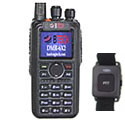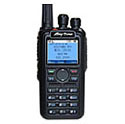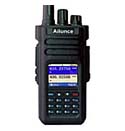Product Review
Radioddity GD-168
Dual Band
DMR Handheld
VHF / UHF


|
Radioddity GD-168
The GD-168 is the new little brother to the AnyTone D878UV series. It is both VHF/UHF DMR as well as FM analog. Here is a comparison between the GD-168 and D878UVii series. In the Box Included with the radio are the following: - (2) Li-Ion Batteries 1800 & 2600 mAh - Belt clip - Charger Base - AC adapter - Programming Cable (USB-C) - (2) Antennas – 4.75" and 15" - 46 page English User Guide Specifications General Description - DMR / FM - VHF / UHF Dual Band - Size: 4.0.x 2.4 x 1.4" (104 x54 x 36mm) - Weight: 7.9 oz (224g) w/battery - 136-174 400-480 MHz ** - CTCSS / DCS - DTMF / 2TONE / 5TONE - Analog / Digital APRS - Analog / Digital Recording - 4 Power Levels .2W / 1.0W / 2.5W / 5.0W - 4000 channels - 10000 Talk Groups - 250 Zones - 500K User DB Contacts - Updatable Firmware - (US) FCC Part 90 certified T4K-D168UV Transmitter The overall frequency range of the GD-168 is both VHF 136-174 and UHF 400-480 MHz. Along with DMR (12.5kHz) the radio also supports FM analog (12.5kHz and 25.0 kHz). Restrictions may apply. (see below) ** On the air audio reports were excellent on both DMR and Analog. There 5 selectable microphone audio levels. I chose the Mid-level (3) which provided smooth audio with excellent frequency audio range. I highly advise Not to use level 5 as the audio was way too hot and definitely not recommended for DMR operation. The radio holds true to its power specifications. Rated at 5W, the radios output levels were right on target using a calibrated Bird Termaline wattmeter. ** Transmit may be restricted depending on country.
Receiver and Audio The receiver sensitivity is very good on both digital and analog. I found the receive audio is smooth with a wide frequency range. The volume control range is adjustable with the software. Level 1 sets the full range of the volume control to a soft level, even at full volume. Level 8 sets the volume range to very loud at the top end. My preference is level 5 which is plenty loud, even for mobile operation. Enclosure The GD-168 case has a good solid feel and is a bit lighter than the AnyTone 878 series. It weighs in at 7.9oz (224g) with the battery attached. Battery removal requires a simple slide of the battery lock on the bottom. The keypad buttons a bit on the small side but to be expected a radio with a smaller profile. It has the traditional 4x3 layout with the Up/Down arrows used for changing groups and the Green/Red Select/Return keys. The top of the GD-168 includes both a Volume and Channel knob.
The PTT button requires only a light pressure that doesn't tire the finger to press. Below the PTT button are 2 program function keys. Each key has 3 possible options. Short press, Long press 1 (1 second) and Long press 2 (2 second). Each has 50+ selection options.
Antenna There were 2 antennas inside the box. Both are dual band and when placed on a NanoVNA swept very well on both VHF and UHF.
Display The radio's latest firmware has a high contrast white on black display. The screen size is 1.77" with excellent resolution. The Channel information and Zone name colors can be changed to Orange, Red, Yellow, Green, Turquoise or Blue.
Software Along with entering data in the conventional manner, the software allows you to import and export data to 'csv' files. Loading in a contact (TG) list, channel list, database, etc. is relatively simple. If you currently have an AnyTone 868 or 878 series handheld, your current code plug can be exported to a CSV file then imported to the GD-168. I found being able to export to a 'csv' file has several advantages. I like having my channel list in sequence. With most software, you can only add new channels to the bottom of the list. Now I can sequence the list so it's easy to view then load it back into the code plug. Adding a new repeater can be done in minutes. I just cut and paste a copy of an existing repeater, change the frequencies, and load it back. Firmware The GD-168 is fully upgradable. When enhancements, updates or additional features are added, the radio can be updated to the most recent version. A firmware upgrade can be done with a Windows computer in about 5 minutes. Important Note: Whenever the firmware is updated, the software Must be updated as well for the new functions to be activated. Programming / Charging Cable via USB-C cable The GD-168 uses a standard USB-C cable (included) for both Programming and Charging. The 2 pin K1 style cable is used for an external Spkr/Micr if desired.(not programming). The UART chip is inside the radio, so the cable itself is straight through. The driver for this UART chip will load automatically when the cable is initially plugged in. As for compatibility, I run the software on my Vista, Win7 and Win10 PCs with no issues.
Battery and Charger The GD-168 is supplied with 2 Li-Ion batteries (1800mAh and 2600mAh). A charger base is also included as well as an charger for the USB-C cable. The LED on the front of the charger base is Red when charging, and Green when either fully charged or no radio in the cradle. The battery charges to full capacity with an overnight charge.br /> APRS At this time the GD-168 has Analog and Digital APRS, however not having GPS at this time, it requires fixed beacon information to be entered. Conclusion The GD-168 does not have GPS at this time but is slated to be added in the future. The radio has excellent quality and is a very good performing DMR/Analog handheld. The GD-168 features are the following: - True Tier II DMR - Dual Band VHF / UHF operation - 2TONE and 5TONE decoding - 500K user database capacity - Two Batteries - 1800 / 2600 mAh - USB-C for both programming and charging There are plenty of options geared more for hams than commercial use. It's a solid performing handheld and will make a nice addition to the ham shack.
|
Note: This equipment was received for the purpose of a fair and unbiased review. All findings are factual based on the equipment I received. Any issues found have been reported both here and back to the seller or manufacturer.
BTECH  DMR6X2 PRO Dual Band (Review) Anytone  D878UV II+ Dual Band (Review)  D578UV Series Mobiles Hotspot  SkyBridge MAX (Review) Ailunce  HD1 / GPS (Review) Amplifiers  BTECH DMR Amps UHF VHF (Review) Repeaters  Ham / GMRS Commercial Repeaters Duplexers |











